新视野大学英语第三册unit5_graceful_hands全文翻译与原文
- 格式:doc
- 大小:27.00 KB
- 文档页数:9
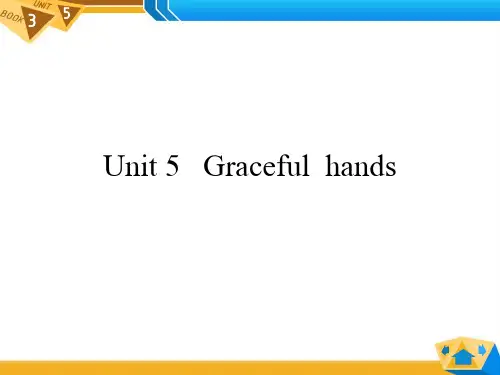
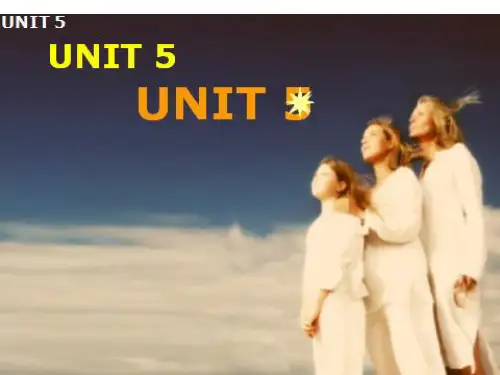
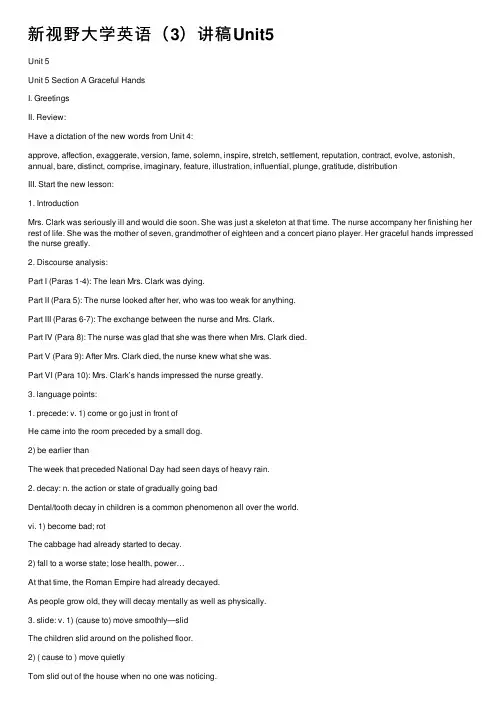
新视野⼤学英语(3)讲稿Unit5Unit 5Unit 5 Section A Graceful HandsI. GreetingsII. Review:Have a dictation of the new words from Unit 4:approve, affection, exaggerate, version, fame, solemn, inspire, stretch, settlement, reputation, contract, evolve, astonish, annual, bare, distinct, comprise, imaginary, feature, illustration, influential, plunge, gratitude, distributionIII. Start the new lesson:1. IntroductionMrs. Clark was seriously ill and would die soon. She was just a skeleton at that time. The nurse accompany her finishing her rest of life. She was the mother of seven, grandmother of eighteen and a concert piano player. Her graceful hands impressed the nurse greatly.2. Discourse analysis:Part I (Paras 1-4): The lean Mrs. Clark was dying.Part II (Para 5): The nurse looked after her, who was too weak for anything.Part III (Paras 6-7): The exchange between the nurse and Mrs. Clark.Part IV (Para 8): The nurse was glad that she was there when Mrs. Clark died.Part V (Para 9): After Mrs. Clark died, the nurse knew what she was.Part VI (Para 10): Mrs. Clark’s hands impressed the nurse greatly.3. language points:1. precede: v. 1) come or go just in front ofHe came into the room preceded by a small dog.2) be earlier thanThe week that preceded National Day had seen days of heavy rain.2. decay: n. the action or state of gradually going badDental/tooth decay in children is a common phenomenon all over the world.vi. 1) become bad; rotThe cabbage had already started to decay.2) fall to a worse state; lose health, power…At that time, the Roman Empire had already decayed.As people grow old, they will decay mentally as well as physically.3. slide: v. 1) (cause to) move smoothly—slidThe children slid around on the polished floor.2) ( cause to ) move quietlyTom slid out of the house when no one was noticing.An elderly lady slid into the seat when the movie had already started.3) slide intoThe boy slid into the bad habit of smoking.4) gradually change to a worse state or conditionDon’t sell your stocks just because the price starts to slide.The prices of small computers slide fast.n. slide showPresentations with overhead projection or slides may soon look old-fashioned.4. ease: v. 1) relieve; lessenTake this medicine and it will ease the pain./ The aspirin eased his headache.2) make more comfortableI eased her mind by telling her that the children were safe.n. 1) leisure; peace of mindThe retired couple lived a life of ease.2) with ease, the ability to do sth. without difficultyHe writes with ease. / Our team won the game with ease.The wall is so low that they can jump over it with ease.5. outline: n. 1) line(s) showing the shape or outer edge (of sth)She could see the outline of a person through the mist.2) a statement of the main facts or pointsa brief outline of Chinese historyvi. give a short general description of (sth)Let me outline a few of the obstacles that we might encounter in our future work. 6. hint: n. 1) a slight indication Give me a hint so that I can solve the riddle.2) a subtle way of indicating to sb. what one is thinking or what one wantsThe book is full of hints and tips on low-fat eating and healthy living.v. suggest sth slightly or indirectlyI hinted to him that I was dissatisfied with his work.7. interval: n. 1) a period between two events or times, or the space between two pointsThere was a long interval before he replied.2) a brief period between the parts of performanceI like to eat ice cream in the interval./ Coffee is available during intervals.at intervals (of)He is likely to need to rest at frequent intervals.Trees are planted at intervals of three feet in this area.8. blank: a. 1) empty: I tried to explain, but he just gave me a blank look.Emily turned to him with a blank expression.2) carrying no information or markPlease write your name in the blank space at the top of the page.He turned on the TV but nothing was happening--- a blank screen.n. an empty spaceWhen I tried to remember his name, my mind was a complete blank.When you have completed the blank, send it back to me.IV. Summary:Mrs. Clark was seriously ill and would die soon. She was just a skeleton at that time. The nurse accompany her finishing her rest of life. She was the mother of seven,grandmother of eighteen and a concert piano player. Her graceful hands impressed the nurse greatly.V. Homework Write a composition entitled “Laying-off”.Section B Decisions of the HeartI. GreetingsII. Review:1. Answer the question: Why was the word “graceful”used to describe the grandmother?2. Have a dictation of one paragraph.III. Start the new lesson:1. IntroductionDecisions of the heart actually refer to making patients die without pain. That is to say, in order to alleviate their suffering, the lives of the patients who are seriously ill and hopeless shouldn’t be prolonged by modern medical technology. Doctors shoe the situation of the patient to the families, and they cooperate to decide whether or not the doctor let the patient die without any pain. Under any possible circumstances, the patient should be consulted.2. Discourse analysis:Part I (Paras 1-5): The author gives us a question that what we should do if our90-year-old mother has suffered a stroke.Part II(Paras 6-12): As a doctor, he tells us the measures we should take according to his experience.Part I (Paras 13-17): In this case, the sensible decision is to put the patient’s interest in the first place.3. language points:1. ( all ) on one’s own 1) aloneJohn lives all on his own. / I need some time on my own.2) without helpI managed to repair the car all on my own.She is old enough to do it on her own.Compare: of one’s ownKate has always wanted a car of her own. / You see, we have problems of our own. 2. come along: arrive; appearIs your daughter married yet?No, she’s still waiting for Mr. Right to come along.They had no idea if success would come along one day.3. condemn: vt. criticize strongly, usu. for moral reasonsEast and west leaders join in condemning violence and killing.The author condemned racism in the strongest language in this article.condemn sb to : 1) make sb. take or accept sth. unpleasantHis broken leg condemned him to a wheelchair.2) punish sb with sthIn former times a murderer who was found guilty would be condemned to death.Compare: condemn sb/sth for: have a poor opinion of sb or sth because of sth bad The city was condemned for its high crime rate.4. fight off: keep sth away with an effort; avoid sb. unwantedI must wear warm clothes, as I am fighting off this cold.The firm had to fight off a lot of competitors to win the contract.Compare: fight against: oppose sth or doing sthI tried to fight against sleep, but in vain.We must fight against unfairness and cruelty.5. vain: a. 1) unsuccessful or useless; of no valueNext day I made a vain attempt to look for work, walking from house to house.2) too interested in one’s own appearance or achievementsI think she is a rather vain girl and thinking too much about her figure.Was he as calculating and vain as that?in vain: with no result; uselesslyOur efforts were not in vain and the situation began to improve.Her voice was beginning to rise and she tried in vain to control it.6. withdraw: v. 1) pull or take (sb/sth) back or awayJack withdrew the key from the table. / Mary withdrew 100 pounds from the bank. She was not surprised when he withdrew his objection.2) go away from a place or from other peopleThe smaller company later withdrew from the competition.7. come by: 1) obtain, usu. By effortJobs are hard to come by now with so many people out of work.Did you come by the money honestly?2) receive by accident or chance; getHow did you come by that wound in your arm?8. Chances are (that)…: It is likely that…Chances are that he won’t come back when he gets there.Chances are that She’ll marry the man who is now her boss.9. bring in: ask sb. to come to one’s helpWe may have to bring extra workers in to help us with this big job.A specialist was brought in to set up the new computer system.10. bar: vt. 1) prevent from doing or using sthIf I were in charge, I would bar tourists from getting into the wildlife reserve.He was barred for life from game.2) obstruct so as to prevent progressNo policeman seemed brave enough to bar his way.IV. Summary: We learn a lot of new words and phrases as well as grammars. We also learn many things about reading skills —understanding idiomatic expressions. V. Do the exercisesVI. Homework: Review all the lessons.。
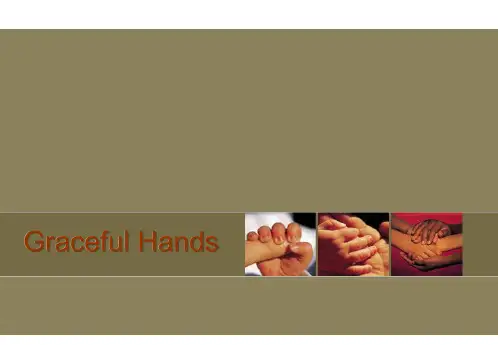
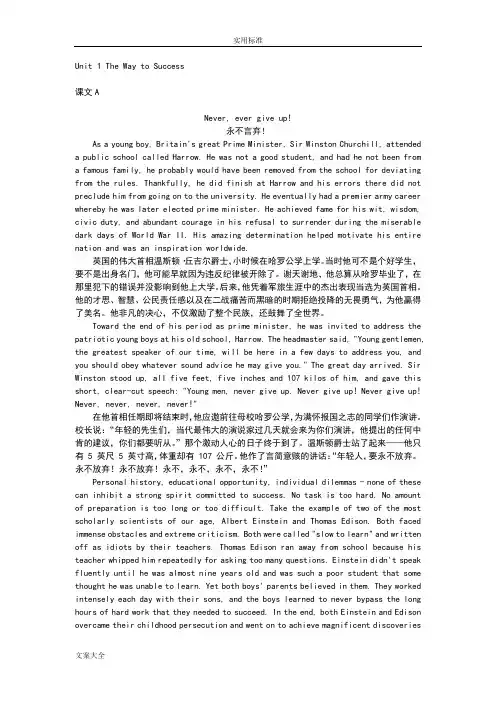
Unit 1 The Way to Success课文ANever, ever give up!永不言弃!As a young boy, Britain's great Prime Minister, Sir Winston Churchill, attended a public school called Harrow. He was not a good student, and had he not been from a famous family, he probably would have been removed from the school for deviating from the rules. Thankfully, he did finish at Harrow and his errors there did not preclude him from going on to the university. He eventually had a premier army career whereby he was later elected prime minister. He achieved fame for his wit, wisdom, civic duty, and abundant courage in his refusal to surrender during the miserable dark days of World War II. His amazing determination helped motivate his entire nation and was an inspiration worldwide.英国的伟大首相温斯顿·丘吉尔爵士,小时候在哈罗公学上学。
当时他可不是个好学生,要不是出身名门,他可能早就因为违反纪律被开除了。
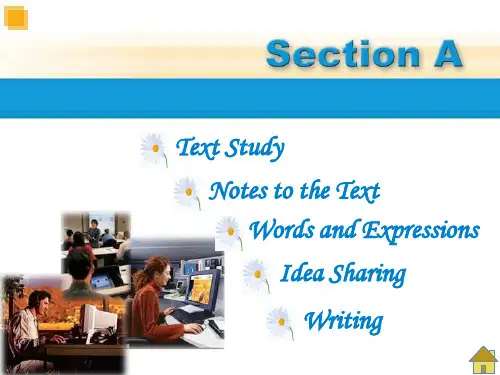
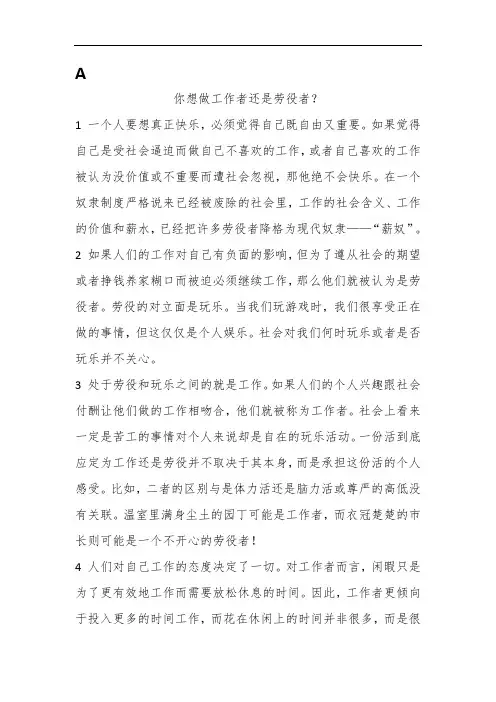
A你想做工作者还是劳役者?1 一个人要想真正快乐,必须觉得自己既自由又重要。
如果觉得自己是受社会逼迫而做自己不喜欢的工作,或者自己喜欢的工作被认为没价值或不重要而遭社会忽视,那他绝不会快乐。
在一个奴隶制度严格说来已经被废除的社会里,工作的社会含义、工作的价值和薪水,已经把许多劳役者降格为现代奴隶——“薪奴”。
2 如果人们的工作对自己有负面的影响,但为了遵从社会的期望或者挣钱养家糊口而被迫必须继续工作,那么他们就被认为是劳役者。
劳役的对立面是玩乐。
当我们玩游戏时,我们很享受正在做的事情,但这仅仅是个人娱乐。
社会对我们何时玩乐或者是否玩乐并不关心。
3 处于劳役和玩乐之间的就是工作。
如果人们的个人兴趣跟社会付酬让他们做的工作相吻合,他们就被称为工作者。
社会上看来一定是苦工的事情对个人来说却是自在的玩乐活动。
一份活到底应定为工作还是劳役并不取决于其本身,而是承担这份活的个人感受。
比如,二者的区别与是体力活还是脑力活或尊严的高低没有关联。
温室里满身尘土的园丁可能是工作者,而衣冠楚楚的市长则可能是一个不开心的劳役者!4 人们对自己工作的态度决定了一切。
对工作者而言,闲暇只是为了更有效地工作而需要放松休息的时间。
因此,工作者更倾向于投入更多的时间工作,而花在休闲上的时间并非很多,而是很少。
而对劳役者而言,休闲意味着从被迫状态中得到自主。
因此,他们自然会想,花在劳作上的时间越少,自在玩乐的时间越多,则越好。
5 除了花在闲暇上的时间不同,工作者和劳役者的区别还在于他们从工作中获得的个人满足感不同。
工作者喜欢自己的工作,感觉更快乐,更轻松,通常对自己的生活更满意。
他们工作起来也会更勤奋,更精细,因为他们对自己的工作已经产生了一种自豪感。
相反,由于劳役者的唯一动力是挣生活费,他们觉得每天花在苦差上的时间是一种浪费,不会让自己快乐。
他们不把每天的24小时都当作愉快有用的时光,认为只有花在休闲娱乐上的时间才是有意义的。
不幸的是,劳役者太常见了,只有一小部分人能有幸成为工作者。
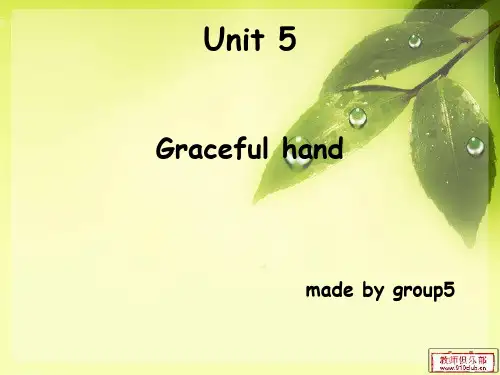
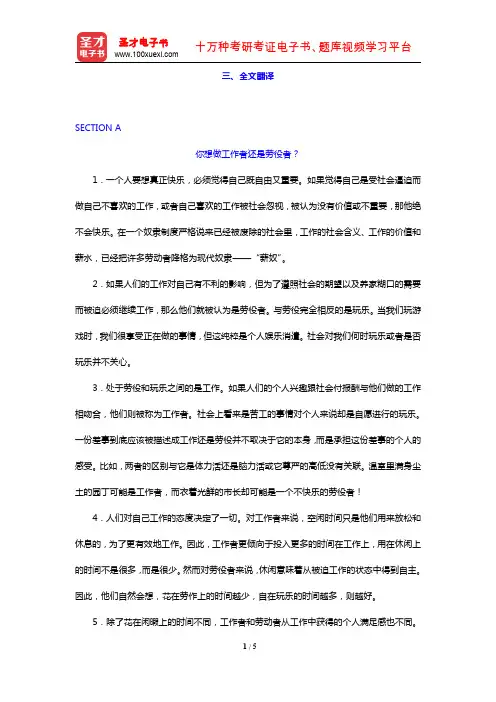
三、全文翻译SECTION A你想做工作者还是劳役者?1.一个人要想真正快乐,必须觉得自己既自由又重要。
如果觉得自己是受社会逼迫而做自己不喜欢的工作,或者自己喜欢的工作被社会忽视,被认为没有价值或不重要,那他绝不会快乐。
在一个奴隶制度严格说来已经被废除的社会里,工作的社会含义、工作的价值和薪水,已经把许多劳动者降格为现代奴隶——“薪奴”。
2.如果人们的工作对自己有不利的影响,但为了遵照社会的期望以及养家糊口的需要而被迫必须继续工作,那么他们就被认为是劳役者。
与劳役完全相反的是玩乐。
当我们玩游戏时,我们很享受正在做的事情,但这纯粹是个人娱乐消遣。
社会对我们何时玩乐或者是否玩乐并不关心。
3.处于劳役和玩乐之间的是工作。
如果人们的个人兴趣跟社会付报酬与他们做的工作相吻合,他们则被称为工作者。
社会上看来是苦工的事情对个人来说却是自愿进行的玩乐。
一份差事到底应该被描述成工作还是劳役并不取决于它的本身,而是承担这份差事的个人的感受。
比如,两者的区别与它是体力活还是脑力活或它尊严的高低没有关联。
温室里满身尘土的园丁可能是工作者,而衣着光鲜的市长却可能是一个不快乐的劳役者!4.人们对自己工作的态度决定了一切。
对工作者来说,空闲时间只是他们用来放松和休息的,为了更有效地工作。
因此,工作者更倾向于投入更多的时间在工作上,用在休闲上的时间不是很多,而是很少。
然而对劳役者来说,休闲意味着从被迫工作的状态中得到自主。
因此,他们自然会想,花在劳作上的时间越少,自在玩乐的时间越多,则越好。
5.除了花在闲暇上的时间不同,工作者和劳动者从工作中获得的个人满足感也不同。
工作者喜欢自己的工作,感觉更快乐,更轻松,通常对自己的生活也更满意。
他们工作起来也会更勤奋、更精细,因为他们对自己的工作已经产生了一种自豪感。
相反,由于劳役者的唯一动力是赚生活费,他们觉得每天花在苦差事上的时间是一种浪费,不会给自己带来快乐。
他们认为只有花在消遣和玩乐上的时间才有意义,而不是把每天的24小时都当作愉快有用的时间。
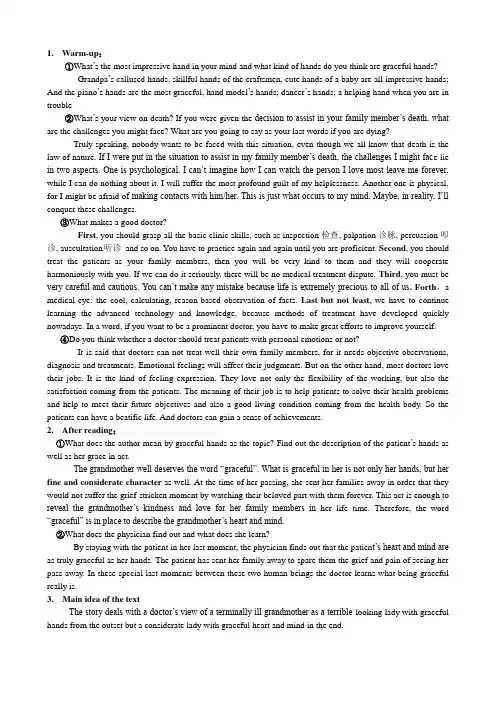
1.Warm-up:①What’s the most impressive hand in your mind and what kind of hands do you think are graceful hands?Grandpa’s callused hands, skillful hands of the craftsmen, cute hands of a baby are all impressive hands; And the piano’s hands are the most graceful, hand model’s hands; dancer’s hands; a helping hand when you are in trouble②What’s your view on death? If you were given the decision to assist in your family member’s death, what are the challenges you might face? What are you going to say as your last words if you are dying?Truly speaking, nobody wants to be faced with this situation, even though we all know that death is the law of nature. If I were put in the situation to assist in my family member’s death, the challenges I might fac e lie in two aspects. One is psychological. I can’t imagine how I can watch the person I love most leave me forever, while I can do nothing about it. I will suffer the most profound guilt of my helplessness. Another one is physical, for I might be afraid o f making contacts with him/her. This is just what occurs to my mind. Maybe, in reality, I’ll conquer these challenges.③What makes a good doctor?First, you should grasp all the basic clinic skills, such as inspection检查, palpation诊脉, percussion叩诊, auscultation听诊and so on. You have to practice again and again until you are proficient. Second, you should treat the patients as your family members, then you will be very kind to them and they will cooperate harmoniously with you. If we can do it seriously, there will be no medical treatment dispute. Third, you must be very careful and cautious. You can’t make any mistake because life is extremely precious to all of us. Forth,a medical eye: the cool, calculating, reason-based observation of facts. Last but not least, we have to continue learning the advanced technology and knowledge, because methods of treatment have developed quickly nowadays. In a word, if you want to be a prominent doctor, you have to make great efforts to improve yourself.④Do you think whether a doctor should treat patients with personal emotions or not?It is said that doctors can not treat well their own family members, for it needs objective observations, diagnosis and treatments. Emotional feelings will affect their judgments. But on the other hand, most doctors love their jobs. It is the kind of feeling expression. They love not only the flexibility of the working, but also the satisfaction coming from the patients. The meaning of their job is to help patients to solve their health problems and help to meet their future objectives and also a good living condition coming from the health body. So the patients can have a beatific life. And doctors can gain a sense of achievements.2.After reading:①What does the author mean by graceful hands as the topic? Find out the description of the patient’s hands as well as her grace in act.The grandmother well deserves the word “graceful”. What is graceful in her is not only her hands, but her fine and considerate character as well. At the time of her passing, she sent her families away in order that they would not suffer the grief-stricken moment by watching their beloved part with them forever. This act is enough to reveal the grandmother’s kindness and love for her family members in her life time. Therefore, the word “graceful” is in place to describe the grandmother’s heart and mind.②What does the physician find out and what does she learn?By staying with the patient in her last moment, the physician finds out that the patien t’s heart and mind are as truly graceful as her hands. The patient has sent her family away to spare them the grief and pain of seeing her pass away. In these special last moments between these two human beings the doctor learns what being graceful really is.3. Main idea of the textThe story deals with a doctor’s view of a terminally ill grandmother as a terrible-looking lady with graceful hands from the outset but a considerate lady with graceful heart and mind in the end.。
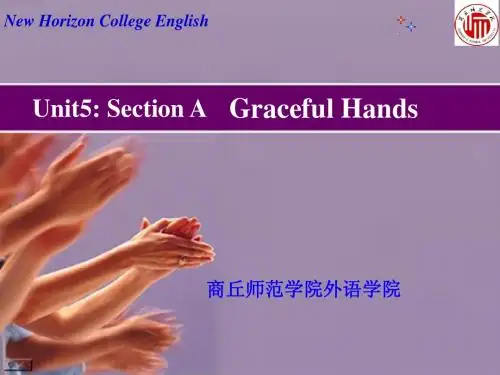
Unit 4The Statue of Liberty <B>自由女神像</B>In the mid-1870s, French artist Frederic Auguste Bartholdi was working on an enormous project called Liberty Enlightening the World, a monument celebrating US independence and the France-America alliance.19世纪70年代中期,法国艺术家弗里德里克·奥古斯特·巴托尔迪正在设计一个大项目,名为“自由照耀世界”。
这是一座庆祝美国独立和美法联盟的纪念碑。
At the same time, he was in love with a woman whom he had met in Canada.与此同时,他爱上了一位他在加拿大认识的女子。
His mother could not approve of her son's affection for a woman she had never met, but Bartholdi went ahead and married his love in 1876.他母亲不赞成自己的儿子和一个她没有见过的女子恋爱,然而巴托尔迪不为所动,和心中所爱于1876年结为伉俪。
That same year Bartholdi had assembled the statue's right arm and torch, and displayed them in Philadelphia.同年,巴托尔迪组装完雕像的右臂和火炬,并将它们陈列在费城。
It is said that he had used his wife's arm as the model, but felt her face was too beautiful for the statue.据说,他用了妻子的手臂为模本,但觉得她的脸太漂亮,不适合做雕像模本。
Graceful handsIt’s Mrs Clark’s long and graceful hands that spread the power of love. She has done so much for us and she is deserved to be remembered.Going through her whole life, she had devoted into her career to helping people in need and never gave up. She was an active member of her church, a leader of volunteer association in her community, a concert piano teacher for over thirty years. She was the very person that had done too much for the world but never asked for being payed back.She was such a warm-hearted and modest person who never explained too much on what she had done and what a hard life she was living. When she was in hospital, no one came to see her because none of the people who had been helped by Mrs Clark knew her name, which meant she was a selfless woman. She didn’t want these people to feel they were always in the hug of her and bring them any trouble, so did she do to her families. As we can see, she was the mother of seven, grandmother of eighteen, but when she was too weak to be in hospital waiting for death, no her families came to see her. She didn’t want her families to withstand this cruel fact so that she would rather took all of these by her self.She is alone in her end of life but I think she would never feel lonely because what she had done made her combined with the wold tightly and we would never forgotten this giant woman ,her graceful hands, would we?。
新视野大学英语第三册课文翻译Unit1 AMy brother, Jimmy, did not get enough oxygen during a difficult delivery, leaving him with brain damage, and two years later I was born. Since then, my life revolved around my brother’s. Accompanying my growing up was always “go out and play and take your brother with you”. I couldn’t go anywhere without him, so I urged the neighborhood kids to come to my house for some out-of-control kid-centered fun我哥哥吉米出生时遇上难产,因为缺氧导致大脑受损。
两年后,我出生了.从此以后,我的生活便围绕我哥哥转。
伴随我成长的,是“到外面去玩,把你哥哥也带上。
”不带上他,我是哪里也去不了的。
因此,我怂恿邻居的孩子到我家来,尽情地玩孩子们玩的游戏。
My mother taught Jimmy practical things like how to brush his teeth or put on belt. My father, a saint, simply held the house together with his patience and understanding.I was in charge outside where I administered justice by tracking down the parents of the kids who picked on my brother, and telling on them.我母亲教吉米学习日常自理,比如刷牙或系皮带什么的.我父亲宅心仁厚,他的耐心和理解使一家人心贴着心。
unit5 Graceful Hands 优雅的双手我从未见过克拉克夫人,但看过她的医疗记录和上一位值班医生交给我的报告后,我知道她今晚会去世。
她屋里唯一的光线来自一台医疗设备,它闪着红光,似乎在发出警告。
我站在那里,一股怪味刺激着我的鼻子,我想起了过去闻到过的腐烂的气味,我闭上了眼睛。
我嘴里有一股从胃里返上来的酸味。
我伸手去开灯。
灯静静地照亮了整个病房,我走回病床边,用无动于衷的、医生的目光观察着病人。
克拉克夫人已奄奄一息了。
她一动不动地躺着:骨瘦如柴的身体使她的头显得特别大;皮肤呈暗黄色,松松地裹在嶙峋的、连毛毯也遮掩不住的骨骼上;她的右臂平伸在床边,被无情地用胶带固定在一块板上,以便能固定针头使液体滴入;左臂横放在深陷的胸部,胸口随着不均匀的呼吸一起一伏。
我伸手去触摸她放在胸口的细长手指。
冰凉冰凉的。
我忙将手移到她的手腕,去感觉那微弱的脉搏。
克拉克夫人将头稍稍转向我,微微地睁开眼。
我俯过身去,勉强听见她微弱的声音:“水。
”我从桌上拿起一杯水,用手指封着吸管的一端,滴了几滴凉凉的水到她的嘴里,以缓解她的干渴。
她没有用力去吞咽,因为力气不够。
“还要,”那干涩的声音说。
于是我们又重复了一次。
这次她终于咽了一些,并轻轻说了声:“谢谢,你。
”她虚弱得没法交谈,因此没等她要求,我就开始做她所需要的。
我像抱孩子似的把她抱起来,给她翻了个身。
除了一件浅色的病号服,她什么也没穿。
她又小又轻,像遭受了严重饥荒一样。
我打开护肤霜的瓶盖,揩了一些在手心。
为了不伤着她,我小心翼翼地把护肤霜擦在她发黄的皮肤上。
她的皮肤松松地在骨头上滑动,背上每块骨头的轮廓都能清楚地摸到。
当我把枕头放在她两腿之间时,发现它们也是冰凉的,直到把手移到她膝盖以上的部位,我才感受到血液供给生命的热度。
而后,我挪了把椅子面朝她坐在床边,握住她那只没被固定的手,此时我又一次注意到她细长的手指。
很优雅。
一时间,我突然想知道她是否有家庭,接着我发现病房里没有花,没有孩子们画的彩虹和蝴蝶,也没有卡片。
房间中没有任何迹象表明她是一个被人爱着的人。
她似乎读懂了我的心思,平静地回答我说:“今天……我让……家里人……都……回家……不想……他们……看见……”她耗尽了最后的那点力气,再也说不下去了。
但我已然明白她做了些什么。
我不知道说什么好,所以什么也没说。
她好像又看穿了我的心思:“你……留下……”时间似乎停滞了。
在一片寂静中,我感觉自己的脉搏加快了,我听到自己的呼吸开始伴随着她那不均匀的呼吸一起一落。
我们互相对视,不知怎么的,我们都意识到,这是两个生命间的一个特殊时刻。
她那细长的手指很轻易地就拢住了我的手,我微笑着慢慢点了点头。
无需任何语言,我从她发黄的眼睛中感受到了她对我的谢意,她慢慢闭上了眼睛。
不知过了多长时间,她又睁开了双眼,只是这一次目光里没有任何反应,只有空洞的凝视。
没有一点先兆,她那细弱的呼吸停止了。
很快,微弱的脉搏也消失了。
一颗泪珠从她的左眼中流出,滑过脸颊,落在枕上。
我开始轻声哭泣。
对这位迅速走进又走出我生活的陌生人,我心间涌起了一股感情。
她的痛苦结束了,可她的生命也结束了。
我依然握着她的手,渐渐地,我意识到我并不害怕这种感情之战,意识到这实际是她赐予我的特殊荣幸,而且我还乐意再来一次。
克拉克夫人没有让她的家人目睹这一幕他们或许无力面对的人生插曲,却与我分享了它。
她不想让家人看着她死去,然而她也不愿孤独地离去。
不应当有人孤独离去的,我很高兴能守候在她身边。
两天后,我在报上读到了克拉克夫人的消息。
原来她是7个孩子的母亲、18个孩子的祖母、教会里的活跃分子、社区志愿者协会的领导人、音乐会钢琴演奏家、从教30余年的钢琴教师。
是啊,她的手指是那样细长而优雅。
I have never seen Mrs. Clark before, but I know from her medical chart and the report(that\ which)I received from the preceding shift that tonight she will die.我从未见过克拉克夫人,但看过她的医疗记录和上一位值班医生交给我的报告后,我知道她今晚会去世。
The only light in her room is coming from a piece of medical equipment, which is flashing its red light as if in warning. As I stand there, the smell hits my nose, and I close my eyes as I remember the smell of decay from past experience. In my mouth I have a sour, vinegar taste coming from the pit of my stomach. I reach for the light switch, and as it silently lights the scene, I return to the bed to observe the patient with an unemotional, medical eye.她屋里唯一的光线来自一台医疗设备,它闪着红光,似乎在发出警告。
我站在那里,一股怪味刺激着我的鼻子,我想起了过去闻到过的腐烂的气味,我闭上了眼睛。
我嘴里有一股从胃里返上来的酸味。
我伸手去开灯。
灯静静地照亮了整个病房,我走回病床边,用无动于衷的、医生的目光观察着病人。
Mrs. Clark is dying. She lies motionless: the head seems unusually large on a skeleton body; the skin is dark yellow and hangs loosely around exaggerated bones that not even a blanket can hide; the right arm lies straight out at the side, taped cruelly to a board to secure a needle so that fluid may drip in; the left arm is across the sunken chest, which rises and falls with the uneven breaths.克拉克夫人已奄奄一息了。
她一动不动地躺着:骨瘦如柴的身体使她的头显得特别大;皮肤呈暗黄色,松松地裹在嶙峋的、连毛毯也遮掩不住的骨骼上;她的右臂平伸在床边,被无情地用胶带固定在一块板上,以便能固定针头使液体滴入;左臂横放在深陷的胸部,胸口随着不均匀的呼吸一起一伏。
I reach for the long, thin fingers that are lying on the chest. They are ice cold, and I quickly move to the wrist and feel for the faint pulse. Mrs. Clark's eyes open somewhat as her head turns toward me slightly. I bend close to her and scarcely hearas she whispers, "Water." Taking a glass of water from the table, I put my finger over the end of the straw and allow a few drops of the cool moisture to slide into her mouth and ease her thirst. She makes no attempt to swallow; there is just not enough strength. "More," the dry voice says, and we repeat the procedure. This time she does manage to swallow some liquid and weakly says, "Thank, you."我伸手去触摸她放在胸口的细长手指。
冰凉冰凉的。
我忙将手移到她的手腕,去感觉那微弱的脉搏。
克拉克夫人将头稍稍转向我,微微地睁开眼。
我俯过身去,勉强听见她微弱的声音:“水。
”我从桌上拿起一杯水,用手指封着吸管的一端,滴了几滴凉凉的水到她的嘴里,以缓解她的干渴。
她没有用力去吞咽,因为力气不够。
“还要,”那干涩的声音说。
于是我们又重复了一次。
这次她终于咽了一些,并轻轻说了声:“谢谢,你。
”She is too weak for conversation, so without asking, I go about providing for her needs. Picking her up in my arms like a child, I turn her on her side. Naked, except for a light hospital gown, she is so very small and light that she seems like a victim of some terrible famine. I remove the lid froma jar of skin cream and put some on the palm of my hand. Carefully, to avoid injuring her, I rub cream into the yellow skin, which rolls freely over the bones, feeling perfectly the outline of each bone in the back. Placing a pillow between her legs, I notice that these too are ice cold, and not until I run my hand up over her knees do I feel any of the life-giving warmth of blood.她虚弱得没法交谈,因此没等她要求,我就开始做她所需要的。